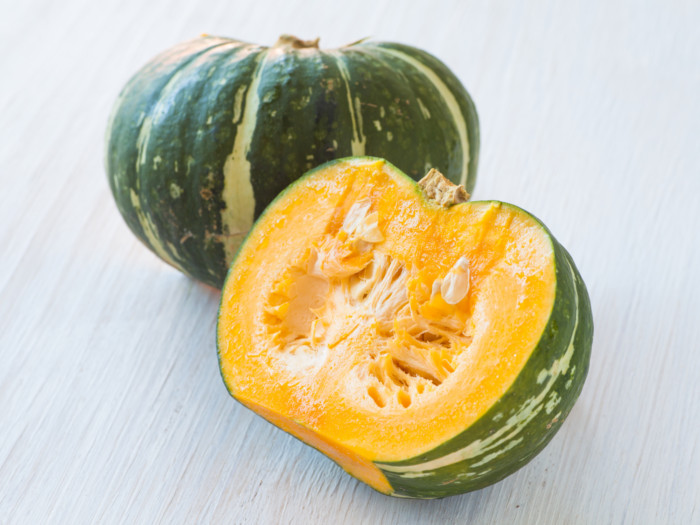Nutrition Facts & Benefits Of Kabocha Squash
What is Kabocha Squash?
Known as the Japanese pumpkin, kabocha squash is a cultivar of winter squash (Cucurbita maxima). It has a hard exterior and a slightly smaller size than other pumpkins. It is primarily dark green in color. There may be some light stripes on the rough exterior, and a bright orange or yellow flesh inside.
Commonly used in sweet dishes, it is known to have one of the sweetest flavors of any squash. [1] It has an approximate consistency of a butternut squash and is quite similar to that variety in many other ways, including how it is cooked.
These fruits are best at the end of the summer or early fall and make an excellent addition to soups and stews, although they can also be cooked as a stand-alone side dish, particularly if seasoned with brown sugar or cinnamon. You will also find kabocha squash as one of the ingredients in vegetable tempura. Aside from the many culinary uses in Japan and beyond, this squash also boasts a number of impressive nutrients, which offer certain health benefits to those who make it a regular part of their diet.
Kabocha Squash Nutrition Facts
Kabocha squash is a rich source of vitamin A and C. It has a low-calorie count, which is only 30 calories per cup. [2] This squash variety is also a good source of iron, copper, magnesium, B vitamins, beta-carotene, dietary fiber, and various antioxidants.

Kabocha Squash Benefits
The most notable health benefits of kabocha squash include its ability to boost skin health, improve vision, strengthen the heart, aid in weight loss, and prevent certain cancers, among others.
Skin Care
Regular consumption of kabocha squash can help your complexion and even reduce the appearance of scars and blemishes. Thanks to the high levels of beta-carotene and other antioxidants found in this variety of squash, it is able to help reduce oxidative stress in the skin, which can also lower inflammation and prevent signs of aging. [3]
Eye Care
Beta-carotene’s other claim to fame is the impact it can have on vision. The orange color of kabocha squash is largely the result of beta-carotene’s presence in it, which can prevent oxidative stress in the retina, thus reducing your risk of macular degeneration, as well as slowing down the development of cataracts. [4]
Prevents Cancer
Studies have found that the unique active ingredient in squash varieties, cucurbitacin, has impressive effects on the propagation of cancer cells in the body. With all of these antioxidants fighting the effects of free radicals in the body, kabocha squash is known as an excellent natural preventive measure for cancer and chronic diseases. [5]
Weight Loss
High in dietary fiber and low in calories, kabocha squash makes for an ideal addition to any weight loss diet. [6] Dietary fiber will help keep you feeling full, while the low-calorie count will let you eat as much of this nutrient-dense fruit as you want without compromising your caloric goals.
Improves Heart Health
With a healthy amount of iron, vitamin C, and vitamin A, this squash variety helps retain the integrity of blood vessels and arteries, lowers blood pressure, and ensures healthy circulation.
Aids in Digestion
The dietary fiber in this squash, particularly in the edible rind (after being cooked), can help optimize digestion, regulate bowel movements and reduce the symptoms of constipation, bloating, and cramping

0 Comments